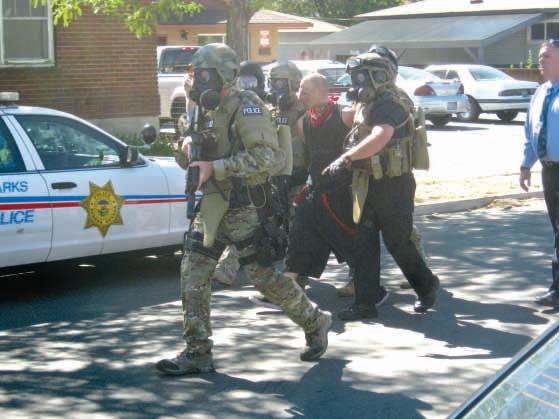
8 minute read
News
from Aug. 21, 2014
Where’s Harry?
Ken Cuccinelli, former Virginia attorney general and head of a group called Senate Conservatives Fund, has sent out a fundraising message attacking U.S. Sen. Harry Reid of Nevada, the Senate Democratic floor leader:
Advertisement
“[Iowa is] one of the most competitive races in the country, and it could determine whether the Democrats continue to control the Senate. Senate Majority Leader Harry Reid (D-NV) knows this, which is why he and his liberal allies are on the air right now attacking [Republican U.S. Senate nominee] Joni Ernst ... with negative, dishonest TV ads. The ads claim that Joni supports shipping jobs overseas because she signed a pledge not to raise taxes. It’s completely bogus. ... Even the left-leaning Politifact rated these attacks as ‘false’.”
Politifact, a Tampa Bay Times website that fact-checks journalists and politicians, has also been denounced by Reid on occasion. The claim against Ernst rests on her having signed the “Taxpayer Protection Pledge” circulated by a special interest group, a claim made against a number of candidates over the past several years. But Politifact, FactCheck and the Associated Press have all adjudged the claim to be false.
What’s not clear is what all this has to do with Reid. The Iowa TV spots are being run not by a Reid political action committee, but by the NextGen Climate Action Committee, which Congressional Quarterly says is funded by billionaire Democratic figure Tom Steyer.
Ace in the hole
Citing major league baseball’s “long, infamous history of labor exploitation dating to its inception,” several former minor league baseball players have sued the commissioner of baseball and Major League Baseball Inc. (MLB Inc.) to try to do something about the pay of minor leaguers, who earn less than fast food workers.
Because of a 92-year-old court ruling and the early-20th century congressional belief that MLB Inc.—which now takes in $8 billion a year—is only a game, not a business, commercial baseball enjoys an anti-trust exemption that allows team owners to conspire against their own players by jointly agreeing to hold down wages. No other professional sport enjoys such privilege.
So Missouri attorney Garrett Broshuis, instead of suing owners for colluding against their players, is trying an ace in the hole—suing for violation of the Fair Labor Standards Act and state laws on grounds that the teams are paying minor league players less than minimum wage and fail to pay overtime. Broshuis played six years in the minors for the San Francisco Giants and also writes for the Sporting News and Baseball America.
That the class action suit is being brought as a minimum wage claim is an indication of how little minor league players can make. Some of them are reportedly supported financially by parents and live in penurious circumstances. The suit charges that players start at $1,100 a month, paid only during the season, which can be as short as three months. They are unpaid during the off season when they are expected to stay in shape. Only about onetenth of players go on to the majors.
The lawsuit quotes congressional testimony by former Giant and Texas Ranger Dan Peltier: “[It is] very much like the indentured servitude of the 1700s. When you first sign, you are owned by that team for basically seven seasons. A team can buy you, sell you, send you to another country, or fire you whenever they want. They can cut you if you get hurt. A player, on the other hand, cannot try to play for someone else. He can’t try out for his home team. You have to play for the team that drafted you even if they are loaded at your position. ... [T]his obsession with making the majors should not be a justification for the current treatment of minor league players, and I certainly hope it would not be used as an excuse to give major league and minor league owners a legal blank check.”
—Dennis Myers
In this June 7, 2012, incident, police in Sparks escorted a fugitive from justice to a police vehicle after capturing him following a standoff on Ninth Street.
Military force
Should local police be outfitted for war?
Fueled by events in Missouri, Seattle, Salt Lake City, and the past, the nation by has seen rising concern over the Dennis Myers “militarization” of hometown police agencies. Among those covering that angle on the Missouri story were Politico, U.S. News and World Report, New York Times, Washington Post, Dallas Morning News, USA Today, Capitol Hill Blue, BuzzFeed, BillMoyers.com, Mother Jones, Raw Story, CBS, ABC, Al Jazeera, Fresno Bee, Los Angeles Times, Seattle Times, and even Vanity Fair.
Mike Haley Washoe County sheriff
One former servicemember who said he served in Iraq, Brandon Friedman, posted a tweet that showed two photos—one of a police officer outfitted like a Ninja Turtle, the other of himself in the war zone wearing his military gear. “The gentleman on the left has more personal body armor and weaponry than I did while invading Iraq,” Friedman pointed out.
The story was pushed to a new level when U.S. senator and undeclared presidential candidate Rand Paul penned an essay for Time magazine: “When you couple this militarization of law enforcement with an erosion of civil liberties and due process that allows the police to become judge and jury—national security letters, no-knock searches, broad general warrants, pre-conviction forfeiture—we begin to have a very serious problem on our hands.”
Clearly, it was an approach to the Missouri story that took on a life of its own. The principal specific remedy proposed, however, has not been action to do something about any alleged military culture in police agencies but rather cancellation of a Defense Department program that has turned over billions of dollars in surplus military hardware—M16 assault rifles, grenade launchers, mine-resistant ambush protected vehicles—to state and local agencies.
Georgia Democratic U.S. Rep. Hank Johnson said he would introduce a “Stop Militarizing Law Enforcement Act” that would reduce or end—the language of the measure is not yet available—the Pentagon program.
“Our main streets should be a place for business, families, and relaxation, not tanks and M16s,” Johnson said in a letter to other congressmembers. “Our local police are quickly beginning to resemble paramilitary forces. This bill will end the free transfers of certain aggressive military equipment to local law enforcement and ensure that all equipment can be accounted for.”
As it happened, however, while concern about police agencies was being expressed, some police officials said they agreed.
“What I would say is that not every sheriff’s office or police department around the country is similarly prepped,” said Washoe County Sheriff Mike Haley. “I am not a proponent for militarizing our police agencies beyond what their missions are. We are citizen soldiers, not armies of occupation.”
He said he would limit the use of heavy armament and military tactics to “SWAT [special weapons and tactics] situations where we know the suspect is armed, we have concerns for the safety of our employees, and we know we have to protect them.” FRIEDMAN TWEET
Drug war
Sen. Paul identified the spread of military practices in police work with the drug war, but while that certainly fueled the problem, SWAT-style approaches to police work date back to the 1960s, when police developed them during the civil rights and antiwar movements that sometimes saw civil disorders and rioting—by police themselves, in one instance. SWAT gear or



tactics were used in situations involving California farm workers and members of the Black Panther organization.
The “war on drugs” that was launched in the Nixon administration and renewed regularly in later administrations also caused a stepup in military practices in police departments. And just as Hollywood came up with programs like 24 after the September 11 tragedies, in the 1970s, an ABC television program called S.W.A.T. used throbbing music and action sequences to spread the notion that military tactics by police were desirable.
September 11 helped accelerate military uses of local police, and not just through the Pentagon program. Department of Homeland Security grants of money to localities helped localities stock up on gear whose usefulness to them was far from certain, as when Colchester, Vermont, population 16,000, used Homeland Security money to buy equipment
for punching holes in collapsed skyscrapers. U.S. Sen. Harry Reid, speaking with Nevada reporters on Aug. 18, said military-style gear can be useful in incidents like the Boston Marathon bombing. “So the question I have is not whether the equipment is needed— it probably is,” Reid said. “How the equipment and supplies are being used is the problem.” He said the feds need to be sure localities “have the ability and resources to train the people HALEY who use it” when the equipment is transferred. Haley worries that military practices by local police agencies puts another obstacle between members of the public and police agencies who, often, are already too distant from the public. “Again, as a citizen soldier, I think our job is to communicate with the public,” he said. “Ninety-eight percent of our work does not require heavy armament.” Ω


U.S. Rep. Hank Johnson Georgia Democrat
Better view
Moviegoers at the downtown Sparks theaters pass a crate containing a new movie screen awaiting installation. The screen, manufactured by Harkness Screens Ltd. of Virginia, is a model called a Perlux 180+ and is 44.5 feet wide and 24.92 feet high.

Playa people, shop local! 15% off
purchases over $100
Not eligible for member equity, gift cards or special orders. Must have coupon present to redeem. Limited to one coupon per customer. Valid until September 1, 2014 W 1ST STREET
open to the public everyday 8am-9pm 240 court st. reno nv www.greatbasinfood.coop 775.324.6133 775.324.6133 VIRGINIA











